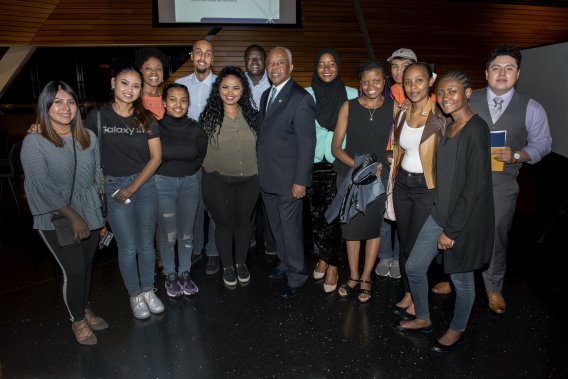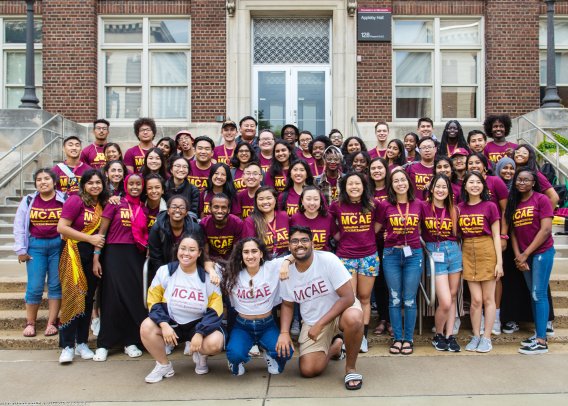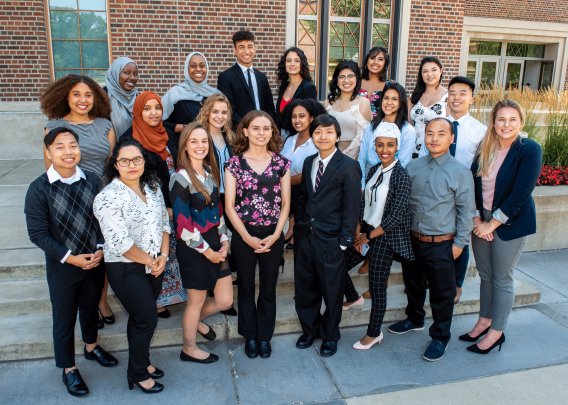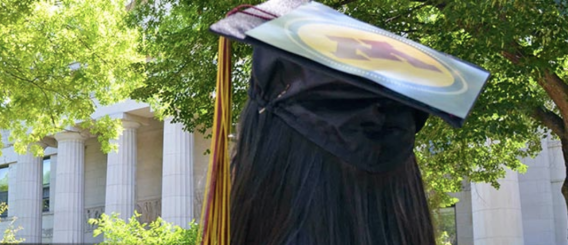Identity-Related Campus Support Services
Louis Stokes North Star STEM Alliance (LSNSSA)
northstarstem.org
Facebook: @NSSAUMN
Instagram: @ls_nssa
LinkedIn group

The LSNSSA—a partnership of 14 higher education institutions and three community partners—is part of Minnesota’s Louis Stokes Alliance for Minority Participation, an initiative funded by the National Science Foundation.
Our mission is to double the number of African American, Hispanic/Latino, Native American, Alaska Native, and Pacific Islander students receiving baccalaureate degrees in science, technology, engineering, and math (STEM) through comprehensive approaches in student development and retention over a five-year period.
Our partners include the Science Museum of Minnesota, Minnesota High Tech Association, and the Minnesota Minority Education Partnership.
Join us!
We provide:
- Academic support
- Peer mentoring
- Assistance in navigating STEM
- Funding for travel, undergraduate research, and outreach
- Networking opportunities
- Leadership and professional development
- Undergraduate research experiences
Become a LSNSSA Scholar today!
northstarstem.org/umtc/apply
Multicultural Center for Academic Excellence (MCAE)
Appleby Hall,
Room 176
mcae@umn.edu
mcae.umn.edu
Circle of Indigenous Nations
Appleby Hall,
Room 322
coin@umn.edu
z.umn.edu/coin

MCAE and the Circle of Indigenous Nations are retention-based offices designed to assist students of color, indigenous students, and first-generation college students to navigate, persist, and succeed in college. We’re driven by a student-first culture in which students are the highest priority.
Our goal is to promote an inclusive atmosphere to foster and enrich multicultural understanding among all members of the University of Minnesota community.
Resources include:
- Academic support—tutors and computer lab
- MCAE Ambassador program—student ambassadors participate in activities such as prospective student and K-12 outreach, student panel discussions, and focus groups
- The Circle of Indigenous Nations—supports American Indian/First Nations/Alaskan Native students through a variety of services, such as tutoring for Ojibwe and Dakota languages, addressing concerns about scholarships, internships, or volunteer opportunities
MCAE is a Twin Cities campus resource that promotes an inclusive atmosphere to foster and enrich multicultural understanding among all members of the University of Minnesota community.
TRIO McNair Scholar Program

McNair Scholars develop higher-level academic and research skills necessary to gain admission to and successfully complete graduate study.
- Open to all Twin Cities students
- 10-week summer research apprenticeships with a University faculty mentor whose research interests match those of the McNair student
- $3,000 summer stipend, additional $500 during the academic year
- Weekly seminars on study strategies for graduate school and graduate entrance exam preparation
- Year-round seminars and advising services
Multicultural Student Engagement (MCSE)
The Office for Multicultural Student Engagement (MCSE) is dedicated to providing diverse opportunities to all students to increase awareness, understanding, and appreciation for cultural competency, social justice, and intersectionality. Additional information is available on the MCSE website.
Living Learning Communities
The following University of Minnesota Living Learning Communities are open to students from underrepresented groups:
- American Indian Cultural House
- Casa Sol
- Huntley House
- Charlotte's Home
- Lavender House
- Community of Diverse Engineers and Scientists (CODES) LLC *formerly known as the STEM Diversity House
- Tsev Hmoob
- The Firsts
Find more information about Living Learning Communities.
Disability Resource Center
McNamara Alumni Center,
Room 180
612-626-1333
drc@umn.edu
disability.umn.edu
The Disability Resource Center (DRC) promotes access and equity for all students, faculty, staff, and guests of the University of Minnesota.
The DRC serves students with an array of disabilities and health conditions, including those related to chronic and mental health. Students with disabilities may request accommodations to address barriers they anticipate or are presently experiencing through the DRC. We can assist in exploring accommodations in a variety of contexts, including coursework, lab work, on-campus housing, campus jobs, and study abroad.
We provide:
- Learning and working accommodations
- Education and training
- Consultation
- Technical assistance
- Career information
Gender and Sexuality Center for Queer and Trans Life
Appleby Hall,
Room 40
612-625-0537
gsc@umn.edu
gsc.umn.edu
We serve students, staff, faculty, alumni, and community members who identify as lesbian, gay, bisexual, transgender, queer, questioning, asexual, allies, and many other gender and sexual orientation creative identities. We provide education, advocacy, outreach, and support.
We collaborate with academic departments, implement institutional policies and practices, and support student development to ensure our students not only receive academic support, but find community support from the time they enroll for their first semester to when they graduate.
Our goal is to create a campus climate where more inclusive understandings of gender and sexuality foster a sense of belonging for all.
Aurora Center for Advocacy and Education
Appleby Hall,
Room 117
24-hour helpline:
612-626-9111
Business hour textline:
612-615-8911
aurora@umn.edu
aurora.umn.edu
At the Aurora Center, we provide free and confidential services for students, faculty, and staff who are victims, survivors, concerned people of sexual assault, relationship violence, stalking, and sexual harassment.
Our mission:
- Deliver free and confidential services
- Build partnerships with departments on campus
- Create awareness and prevention strategies around sexual assault, relationship violence, stalking, sexual harassment, and oppression
- Provide meaningful volunteer and leadership opportunities
We also provide:
- Drop-ins and appointments
- Prevention education
- Training programs on various topics, including gender equity and bystander intervention
Student Counseling Services
612-624-3323
counseling.umn.edu
Minneapolis:
Appleby Hall,
Room 340
Walk-in hours available
St. Paul:
Coffey Hall,
Room 199
We offer individual and group counseling on academic, personal, and career issues.
- Free
- Confidential
- No appointment needed—first come, first served
Attend academic success workshops, where you can get tips for time management, note-taking, anti-procrastination, test-taking, and more!
Let's Talk
counseling.umn.edu/lets-talk
- Informal drop-in session around campus
- It’s a good fit for you if…
- you are unsure about counseling and wonder what it’s like
- you are not interested in ongoing counseling but want a counselor’s perspective
- you have a specific problem and want someone to talk it through
- you are concerned about a friend and want some thoughts about what to do
Mental Health Collective of Indigenous People and People of Color
- The Twin Cities campus sits on the traditional homelands of the Dakota People—and our group strives to build bridges and create solidarity.
- Open to undergraduate and graduate students, staff, and faculty who self-identify as Indigenous People and/or People of Color at the University. We meet on the first Wednesday of each month:
- Bruininks Hall, Room 420B Noon-1:30 p.m.
Student Academic Support Services
Appleby Hall,
Room 340
612-624-3323
sass@umn.edu
sass.umn.edu
Student Academic Success Services (SASS) was created to promote academic success at the University of Minnesota. Our academic skills coaches will help you identify and develop effective strategies for educational success.
We provide:
- Courses for credit
- One-to-one coaching
- Academic skills assessment
- Academic success workshops for student groups
- Self-help materials
International Student and Scholar Services (ISSS)
Hubert H. Humphrey School,
Room 190
612-626-7100
isss@umn.edu
isss.umn.edu
We’re dedicated to serving the University of Minnesota’s international community.
ISSS supports the University’s internationalization efforts by helping departments bring new foreign nationals into the community; by providing intercultural training for students, staff, and faculty; and by offering events that build links between the U.S. and international communities on campus.
Walk-in advising is available.
Our advisers/counselors are trained to provide:
- Information about non-immigrant visa issues for students and scholars holding F, J, H, and O visas
- Counseling to students about academic, personal, and family matters
- Counseling for students on issues of crosscultural adjustment and professional integration upon returning home
DACA and Dream Act Information
dream.umn.edu
immigration.umn.edu

“Our diversity is among the many things that make us strong. All are welcome here and we support you.”
—University of Minnesota Statement of support for non-citizen U of M community members, November 30, 2016
How do Minnesota Dream Act and/or qualifying DACA students apply for benefits?
Undocumented students can apply for state financial aid by accessing the online application: z.umn.edu/DreamAidApplication.
To be eligible for the Minnesota State Grant, the application must be submitted no later than the 30th day of the term. The results of the application can also be used to qualify for in-state tuition rates at the University of Minnesota Twin Cities and Duluth campuses.
The application should be submitted once for each academic year the student is enrolled in college.
Find answers to frequently asked questions on the U of M Minnesota Dream Act website.
Immigration Response Team
1901 University Avenue SE,
Suite 300
612-624-4224
immigration@umn.edu
immigration.umn.edu
The Immigration Response Team ensures that all students, faculty, and staff who are affected by immigration policy changes—including issues connected with DACA and immigration status— have access to resources and support.
- Free
- Private
- Drop-in sessions available
- Legal help—meet an immigration lawyer
- Updates on immigration policies
Student Legal Services
West Bank Skyway,
Room 160
612-624-1001
usls@umn.edu
sls.umn.edu
Student Legal Service offers legal advice and representation to Student Service Fee-paying University of Minnesota Twin Cities students. We also provide educational programming on legal issues to students, staff, faculty, and the community.
- Free*
- By appointment only
- Notary services
- Immigration services
- Landlord/Tenant legal help
- Educational programs on legal issues
Our office has seven full-time attorneys, two paralegals, two support staff, and two law clerks. Because we are an office just for U of M students, we are able to focus our practice on the legal issues that are often unique to students.
* To students who have paid the University of Minnesota Student Services Fee
